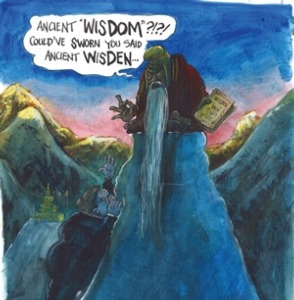
This article is a preview from the Spring 2020 edition of New Humanist
We can all do the calculations, at least up to a point. First, some scientific calculations: if we carry on pumping out greenhouse gases at the present rate, then global heating will soon be out of control, and several million people will die as a result of floods or droughts, and millions more will be left without homes or livelihoods or anything much to eat or drink; after which, things are likely to get worse and worse, ending perhaps with the obliteration of most forms of life on Earth. Next, a few political calculations, such as: capitalism may be the root of the climate emergency, but given that there is no time to lose, it will also have to be part of any solution. Then we can turn to moral calculations: for instance, every new human life puts further strain on the planetary eco-system, so you should not have any children; and given that air travel is a massive part of the problem, you’d better cancel your longed-for holiday in the sun.
When it comes to climate change, we can, it seems, calculate to our heart’s content. But if David Wood is right, calculation will never bring us to the heart of the matter. In his deeply impressive new book, Reoccupy Earth, Wood argues that our everyday intellectual resources are not equal to the task of comprehending the present crisis. Calculation is not enough, he says, and what we need is a good strong dose of philosophy.
Wood is well known for his cool and witty advocacy of the kind of “continental philosophy” that some people hate and others love with a passion. Over the years he has written lucidly about such notoriously disruptive thinkers as Nietzsche, Husserl, Sartre, Merleau-Ponty and Levinas, and above all Heidegger and his mercurial disciple Derrida. And he believes that, while none of them explicitly discussed the prospect of globicide, their work may be indispensable in the struggle to prevent it. One of the main features of the impending calamity is, after all, that it arises not from deliberate destructiveness or nihilistic malice, but from misplaced technological optimism, or even public benevolence gone wrong. The road to climate disaster is paved with good intentions, decked out in fine words like “progress”, “prosperity”, “nature” and “humanity”. Wood’s aim in Reoccupy Earth is to use the techniques of continental philosophy to dismantle such concepts.
Anyone who sets great store by the word “humanism” will find some of the argument hard to take. For Wood, humanism involves not so much a generous and inclusive attitude towards our fellow human beings as a determination to think of ourselves as the crowning glory of God’s creation or Darwin’s evolution – a “masterful subject”, as he puts it, glorying in a sense of absolute entitlement to “planetary dominion”. Humanism in this self-aggrandising sense is not just a philosophical theory, of the kind you can take up or abandon at will: it is what Wood calls a “habit”, built up from layer upon layer of fantasies, phrases, stories and images reaching down into the unconscious and back into the past. “Memories of the campfire die hard,” he says, and when we contemplate the smoke drifting across a starry sky to disappear without trace, we will draw the obvious conclusion that the natural world is like an indulgent parent or a faithful servant, forgiving all our insults, clearing up our messes and making sure that when the tide comes back in, or a new day dawns, or spring comes round again, everything will return to normal, we will all be forgiven and the world will smile on us again.
Philosophy, as Wood defines it, is essentially “the enemy of habit”, and it has a particular bearing on the habits of humanism. In the first part of a three-stage argument, he takes up Derrida’s notions of “deconstruction”, “differentiation” and “undecidability” and applies them to our customary self-image as an isolated fortress of humanity surrounded by something called “nature” or the “environment” or an “external world”. He starts from one of Derrida’s comments about 9/11: that most Americans thought of the attacks as issuing from an undifferentiated elsewhere – an all-embracing “enemy without” – thus blinding themselves to the possibility that this “outside” might in fact have been manufactured in the US. Wood suggests that our habitual interpretations of human existence involve much the same process of “homogenising differentiation”, through which we imagine ourselves as encircled by unbiddable non-human objects which are essentially “different from us” and therefore, as we incuriously assume, “similar to one another”. But a bit of probing reveals chinks in the conceptual armour, and Wood thinks that with the help of what he calls “econstruction” we can train ourselves to see nature not as an undifferentiated externality, but a miscellany of more or less autonomous entities forming tangled webs of relations.
Following this rather abstract critique of humanist conceptual habits, Wood moves on to consider humanist forms of experience. We tend to think of perception as a passive process in which our body responds automatically to the stimulus of external objects – starlight entering our eyes, the chirping of crickets in our ears, smoke up our nostrils, wine down our throat, wind on our skin. But phenomenological theorists from Husserl onwards have urged us to recognise the world as essentially a “human world”, which would not exist unless we had actively endowed it with structure, and built up a sense of ourselves as individuals leading our lives within it. Wood proposes to extend this analysis by developing what he calls “eco-phenomenology”, which will teach us to see the world as “populated by beings of various sorts” – not just human beings – “that . . . open worlds, open onto worlds, and open our eyes to possible worlds by interrupting this one”. Some of us may see eco-phenomenology as a threat to the pleasure we take in the thought of human uniqueness, but Wood promises that it will compensate us with a growing appreciation of diverse “modes of selfhood” and “manifold ways of world-making” which, provided we can snap out of our habitual defensiveness, will fill us with “non-possessive delight”.
The final section of Reoccupy Earth brings together econstruction and eco-phenomenology in order to investigate the implications of the fact that we share our planet with others. Immanuel Kant once observed that human history might have worked out better if the Earth had been flat and unbounded rather than spherical: there would then have been ample space for everyone, and hence no disputes over parcels of land and no such thing as war. The argument is of course a bit simplistic (as Kant no doubt knew), and Wood illuminates the issue by exploring the nature of “place” as opposed to “space”. Space, as he defines it, is an abstract geometrical framework stocked with the sorts of things that are susceptible to objective measurement, whereas place consists of territories saturated with personal significance – the place you went to school, the place you lay down and wept, and above all the place, if there is one, that you call home. The feeling for home is of course entwined with fond memories and sweet sentiments, concerning for example the marks on the wall recording the stages by which a child grew tall, or your mother’s dear old chair by the window. But it can also foster hostility. If you love your home – or for that matter your village or city or country – then you will be inclined to defend it, with violence if necessary, from what you see as encroachments by strangers. Despite the efforts of classical political philosophers from John Locke onwards, this old problem of property – that one person’s wholesome claim to a home is liable to condemn others to wretched homelessness – has never been resolved, either in theory or in practice; and it becomes even more hair-raising if, as Wood maintains, we need to consider the interests not only of our fellow human beings, but also of all our non-human fellow world-makers.
Rather than trying to solve the conundrum, Wood warns against imagining that a definitive solution will ever be found. Classical political philosophy has worked on the assumption that social action ought ultimately to be grounded in respect for eternal principles and universal rights, which will provide us with a basis for working out the right thing to do; but the climate crisis reminds us that our planet is, as Wood puts it, a “historical singularity”, and that timeless universals may never be sufficient to guide us in our choices. On top of that, traditional political philosophy tends to assume that human history is, on the whole, a tale of general improvement, where apparent disasters are really no more than setbacks that will in the long run be redeemed. It also encourages us to take our political orientation from “the future”: to assume that political action is essentially directed towards a better tomorrow and to expect our political heroes to strive for a happier world that they may not live to see. But if the climate continues to deteriorate then the long run will soon be a thing of the past, and tomorrow will never come. Perhaps it is time to abandon all hope, or – as Wood suggests – to seek consolation in a remark attributed to Kafka: that there is “plenty of hope, an infinite amount of hope; but not for us”.
The problems that imminent global catastrophe presents to the political imagination are, it would seem, unprecedented. Religious believers have often spoken about an “end of days”, but what they really have in mind is not so much an end as a new beginning – a rebirth, a rapture or a transfiguration. And when scientifically minded Victorians convinced themselves that the sun was about to cool down and die, so that, as Darwin put it, “all sentient beings are condemned to complete annihilation”, they were at least spared the torment of thinking that human folly was to blame. The dread of nuclear war that overshadowed the 1960s may seem to bear a closer resemblance to present premonitions of climate disaster, but when Bertrand Russell asked, “Has man a future?”, the implied answer was yes: he expected us all to listen to the voice of reason, and persuade our rulers to ban the bomb; and in the unlikely event of nuclear conflagration, he did not seriously suppose that it would lead to the extinction of the human race.
The prospect of obliteration through climate change is different, and Wood brings out its uniqueness by floating the idea that everything might be better – “better for all concerned, and better for all the values we most care about” – if “we gracefully bowed out”; in other words, if, for the sake of non-human forms of life on Earth, we agreed to commit collective suicide. If you are an unreconstructed humanist, you will find the suggestion preposterous: you will say that our supposedly unique capacities for reasoning, reflection, consciousness and self-consciousness trump all other claims to a share of the Earth’s resources. (Humanity first! Make humanity great again!) But if you find Wood’s arguments persuasive, you will be impressed by his observation that we must try to be impartial: if we were birds, after all, then we would be boasting about the transcendent value of unaided flight, and if we were fish we would be convinced of the supremacy of living underwater. Perhaps we need to realise that our tendency to favour human beings is just another case of narrow, self-serving prejudice.
Wood ends up by tacking back to a special kind of humanism – “critical humanism”, he calls it, as opposed to the “narcissistic” variety – which, while respecting the world-making claims of non-human beings, and accepting that we humans are to blame for trashing planet Earth, maintains that in spite of everything we can still bring something special to the planetary party. Building on Heidegger and Derrida, he suggests that our saving grace consists in a capacity for “wonder and metaphysical insight”. We are, he says, the only creatures who can ask questions about why there is something rather than nothing, or what it means to be alive and to face death; and what is more we are alone in being able to acknowledge our vulnerabilities and dependencies, and to practise “attentiveness to the very different ways and shapes of other creatures and forms of life”. Wood admits that he suffers “a hive of doubts” about this last-minute reprieve for humanism – and he wonders if he may have lapsed into a “myopia of species self-promotion”.
I must say I share his doubts: what value does the wondering human have from the point of view of a fish or a bird? Having spent several months absorbing and digesting this profound and unsettling book, I am inclined to cast my vote with Kafka, and conclude that if there is still any hope, it is probably not for us.
“Reoccupy Earth: Notes Toward an Other Beginning” is published by Fordham University Press

